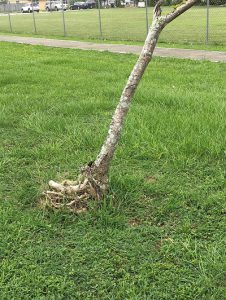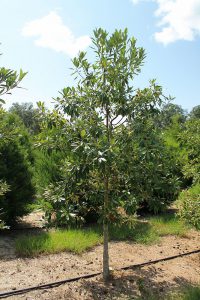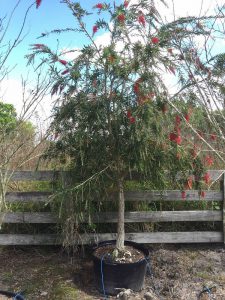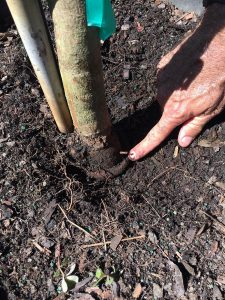Imagine that you want to buy a 2” trunk caliper Live oak tree, Quercus virginiana.
How do you know if it is a quality tree? Maybe it is too short, maybe the crown is too narrow and has dieback, or maybe the foliage is chlorotic? Does the trunk has open wounds or co-dominant stems in the lower half of the tree? Since most trees have a life expectancy of many years, it is important to plant quality trees. The quality of a tree can have a large impact on their longevity in the landscape. A tree’s quality is based on trunk, branch, crown, leaf, and root characteristics.

In order to guarantee that a buyer gets a good quality tree, the Florida Department of Agriculture and Consumer Services, Division of Plant Industry developed the Fifth Edition of the Florida Grades and Standards for Nursery Plants in 2015. You can view the electronic version at file:///C:/Users/hmayer/Downloads/Media_Files_Plant-Industry-Files_Grades-and-Standards_Grades+and+Standards+FEB17+2017.1%20(3).pdf
The document is very complete and covers not only trees, but also palms, shrubs and wetland plants.
They are four qualities or grades:
- Florida Fancy (FF): should have one dominant trunk; branch diameter should not be larger than 2/3 the diameter of the trunk; there should be no flush cuts and no open wounds; the crown should be full of foliage; and the root ball should be appropriately sized and be free of severe defects.

- Florida #1 (#1): may require some corrective pruning so it develops good trunk and branch structure; they may have minor trunk injuries; defects can be corrected by pruning the tree at planting and/or once or twice within a year or two after planting.

- Florida #2 (#2): These trees require major corrective pruning to form a structurally strong tree; a large amount of pruning will be required to develop good tree structure; and defects may take several pruning over time to correct.

- Cull: These trees lack vigor or vitality and/or have poor trunk and branch structure or circling roots; they have other problems such as large open wounds, flush cuts or a loose root ball which may prevent them from becoming established in the landscape; and defects may take several years to correct or may not ever be able to be corrected.

In Florida, all contracts between buyers and sellers specify clearly that the grade has to be Florida #1 or Florida Fancy. Florida #2 and Culls are unacceptable!
Be informed! Buy good quality trees!
Literature Review:
Florida Grades and Standards for Nursery Plants, 2015,
https://www.freshfromflorida.com/Divisions-Offices/Plant-Industry/Business-Services/Florida-Grades-and-Standards-for-Nursery-Plants-2015
 0
0
